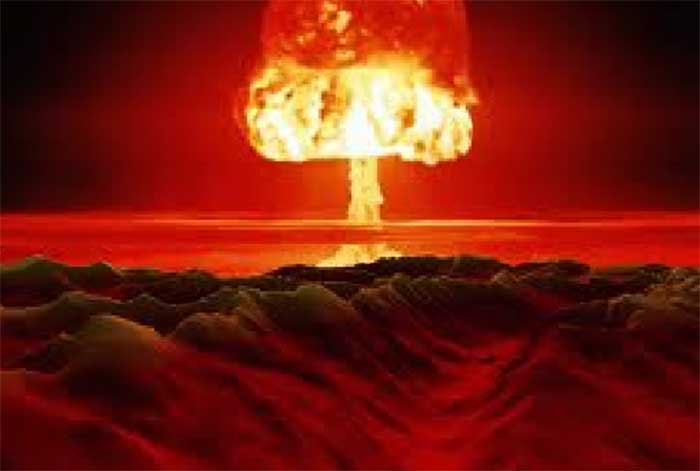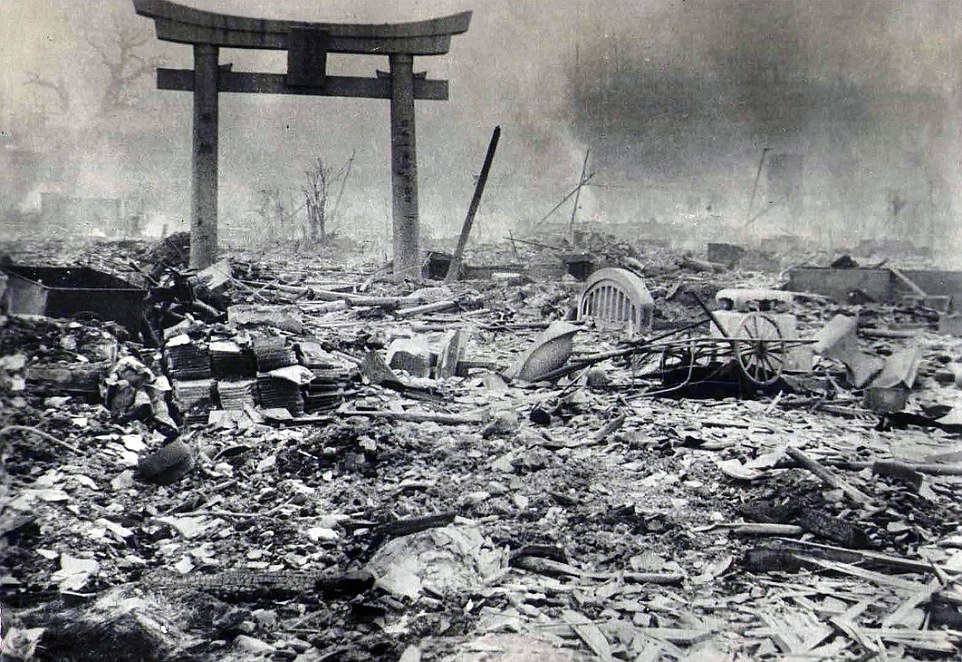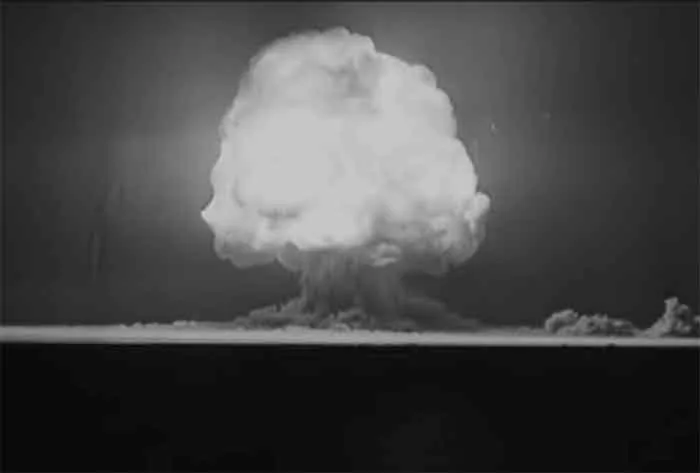
States with the largest nuclear arsenals should negotiate a treaty on no-first-use of nuclear weapons against each other or make a political statement in this regard, the Chinese foreign ministry’s arms control department said.
Citing China’s official news agency Xinhua, a Reuters report said:
‘Director General of the department, Sun Xiaobo, called on nuclear states to fulfil their “special and priority responsibilities” on nuclear disarmament according to the U.N. Conference on Disarmament, which seeks to prevent nuclear war.
‘During the forum’s weekly meeting in Geneva on Monday, Sun said the body should define a roadmap or timetable for an international legal instrument that would protect non-nuclear-weapon states from the threat of nuclear weapons.
‘”Nuclear-weapon states should negotiate and conclude a treaty on no-first-use of nuclear weapons against each other or make a political statement in this regard,” Sun said.
‘China and India are currently the only two nuclear powers to formally maintain a no first use policy. Russia and the United States have the world’s biggest nuclear arsenals.
‘Sun also called for a universal, non-discriminatory, non-proliferation, export control order to address global security challenges, and promote more compliance in the field of biochemistry to maintain the authority of the arms control treaty system.’
The report said:
‘The U.N. disarmament forum should also respond to emerging scientific and technological challenges such as artificial intelligence, outer space and cyber, he said.
‘Sun described the international strategic security situation as facing new challenges, and that countries with the strongest military power have repeatedly “broken treaties” in order to “seek their own absolute superiority”.’
SOMETHING LOOKS WRONG, UN CHIEF ON DEADLOCK IN DISARMAMENT TALKS
Another Reuters report said on Mon, February 26, 2024:
‘U.N. Secretary General Antonio Guterres told the world’s top disarmament negotiating body on Monday it needed to make urgent reforms, accusing it of “paralysis” and failing to compel countries to cut weapons stockpiles.
‘Addressing the Conference on Disarmament in Geneva, Guterres said its failure to fulfil its mandate had created an atmosphere of cynicism over the value of trying to reach multilateral disarmament deals.
‘There was no immediate reaction from the Conference which, according to its website, focuses on negotiating deals to end the nuclear arms race and stop countries building up weapons in space, on top of pursuing general disarmament.
‘”Something looks wrong if a disarmament conference leads to no meaningful disarmament, year after year,” Guterres said.
‘”The paralysis and deadlock that have come to define it is something that is not acceptable. This Conference must be reformed urgently,” he added.
‘He did not mention specific negotiating efforts or give further details on what kind of reforms were needed.’
The report said:
‘The Conference was established in 1979 and is overseen by the United Nations Office for Disarmament Affairs (UNODA). It has 65 member states, including the United States, China and Russia.
‘It has negotiated several multilateral arms control agreements, including the Chemical Weapons Convention (CWC) that came into force in 1997 to prohibit the use and stockpiling of chemical weapons.
‘”From the start, this Conference and its predecessors were supposed to be the antidote to the poison of division and diplomatic paralysis that blocked meaningful disarmament,” Guterres said.
‘”For some time now, this Conference has not been able to function as intended. In fact, this Conference is failing in relation to its very objectives.”’
BEIJING AND MOSCOW SHOULD STRENGETHEN COORDINATION IN ASIA PACIFIC, SAYS CHINA
Citing the Chinese foreign ministry, another Reuters report said on Wed, February 28, 2024:
‘China and Russia should strengthen communication and coordination in Asia Pacific affairs and jointly safeguard regional security, stability and development.
‘China’s Vice Foreign Minister Sun Weidong, who was in Moscow on Monday and Tuesday for talks on bilateral relations, said China and Russia should play a “better role as an anchor of stability in the changing circumstances of the century”, according to the ministry.
‘China stands ready to continuously strengthen strategic coordination between both sides in international multilateral platforms, Sun said in Moscow.
‘Sun’s Moscow talks included the Shanghai Cooperation Organisation (SCO), a Eurasian political, economic, international security and defence organisation established by China and Russia in 2001. He also met Russian Foreign Minister Sergei Lavrov.’
The report said:
‘Both China and Russia exchanged views on the Ukraine crisis and the situation on the Korean peninsula, on top of other international and regional matters, but the ministry statement did not give details on the discussions.
‘Sun said China supports Russia assuming the BRICS presidency this year. Russia took over the presidency for 2024 at Brazil’s request, and plans to hold the BRICS Summit in the city of Kazan in October.
‘The BRICS bloc of developing nations includes China, Brazil, Russia, India and South Africa.’
U.S. CAUTIONS AFTER HAWAII NEIGHBOR KIRIBATI GETS CHINESE POLICE
On Wed, February 28, 2024 a Reuters report said:
‘The United States on Monday cautioned Pacific Islands nations against assistance from Chinese security forces after Reuters reported that Chinese police are working in the remote atoll nation of Kiribati, a neighbor of Hawaii.
‘Kiribati’s acting police commissioner Eeri Aritiera told Reuters last week uniformed Chinese officers were working with police in community policing and a crime database program.
‘Kiribati is a nation of 115,000 people whose closest island is 2,160 km (1,340 miles) south of Honolulu, and the news comes as Beijing renews a push to expand security ties in the Pacific Islands in an intensifying rivalry with the United States.
‘Asked to comment on the Reuters report, a spokesperson for the U.S. State Department responded using the abbreviation of the People’s Republic of China: “We do not believe importing security forces from the PRC will help any Pacific Island country. Instead, doing so risks fueling regional and international tensions.”
‘The official added that Washington did not tolerate China’s “transnational repression efforts,” including its attempts to establish police stations around the world.
‘”We are concerned about the potential implications security agreements and security-related cyber cooperation with the PRC may have for any Pacific Island nation’s autonomy,” the spokesperson said.’
The report said:
‘Kiribati is considered strategic not only given its relative proximity to Hawaii, but because it has one of world’s biggest exclusive economic zones, covering more than 3.5 million square km (1.35 million square miles) of the Pacific.
‘It hosts a Japanese satellite tracking station and China has announced plans to rebuild a World War Two U.S. military airstrip on Kiribati’s Kanton Island, prompting U.S. concern.
‘The United States countered with a pledge in October to upgrade the wharf on Kanton island, a former U.S. military base, and said it wants to open an embassy in Kiribati.
‘Hawaii Senator Brian Schatz issued a statement on Tuesday referring to last week’s Reuters article, saying reporting of China’s growing influence across Pacific Island nations, including Kiribati, underscored the need for the United States to continue strengthening its partnerships in the region.
‘He said it showed the need to “urgently” pass new economic assistance funding for three other strategic Pacific Island states, the Marshall Islands. Micronesia and Palau, which has been held up by budget battles in the U.S. Congress.
‘”To build enduring trust with the people of the Pacific Islands, we need to redouble our efforts to support economic development, help meet infrastructure needs, bolster public health capacity, and more,” Schatz said.’
The report added:
‘China has not responded to a Reuters request for comment on the role of its police in Kiribati, but in a January social media post its embassy named the head of the “Chinese police station” there.
‘Kiribati’s acting police commissioner, Aritiera, said Kiribati had requested China’s policing assistance in 2022 but there was no Chinese police station. Up to a dozen uniformed Chinese police arrived last year on a six-month rotation.
‘A Chinese embassy source confirmed the uniformed officers were working in Kiribati but also said China had not established a police station.
‘China’s efforts to strike a region-wide security and trade deal in the region, where it is a major infrastructure lender, were rejected by the Pacific Islands Forum in 2022.
‘However, Chinese police have been deployed in the Solomon Islands since 2022 after a secret security pact criticized by Washington and Canberra as undermining regional stability.
‘Papua New Guinea, the biggest Pacific Island nation, said this month it would not accept a Chinese offer of police assistance and surveillance technology, after news it was negotiating a policing deal with China prompted criticism from the United States and Australia.’
SOUTH KOREAN AND U.S. TROOPS WILL BEGIN MAJOR EXERCISES NEXT WEEK IN RESPONSE TO NORTH KOREAN THREATS
AN AP report said on Wed, February 28, 2024:
‘South Korean and U.S. troops will begin their expanded annual military drills next week in response to North Korea’s evolving nuclear threats, the two countries said Wednesday, a move that will likely enrage North Korea because it views its rivals’ joint training as an invasion rehearsal.
‘In recent months, North Korea has inflamed animosities on the Korean Peninsula with fiery rhetoric and continued missile tests. While it’s unlikely for North Korea to launch full-blown attacks against South Korea and the U.S., observers say the North could still stage limited provocations along the tense border with South Korea.
‘On Wednesday, the South Korea and U.S. militaries jointly announced that the allies will conduct Freedom Shield exercise, a computer-simulated command post training, and a variety of separate field training, from March 4-14.
‘Col. Lee Sung-Jun, a spokesperson for South Korea’s Joint Chiefs of Staff, told reporters that the allies’ drills are designed to bolster their joint capabilities to prevent North Korea from using its nuclear weapons. He said the allies are to carry out 48 field exercises this spring, twice the number conducted last year, and that this year’s drills would involve air assault, live-firing and bombing training.
‘“Our military is ready to punish North Korea immediately, strongly and to the end in the event of its provocation, and we’ll further strengthen our firm readiness through the upcoming drills,” Lee said.
‘Col. Isaac L. Taylor, a spokesperson for the U.S. military, said the allies’ exercises have been defensive in nature and that there is solid evidence that “a high readiness rate” helps ensure deterrence.’
It said:
‘North Korea did not immediately respond to the drills’ announcement. North Korea has reacted to previous major South Korea-U.S. military drills with its own missile tests.
‘North Korea has sharply intensified its weapons testing activities since 2022 in part of its efforts to expand its nuclear and missile arsenals. This year, the North already conducted six rounds of missile tests — five of them reportedly involving cruise missiles — and other weapons launches.
‘Lee, the South Korean military spokesperson, said that the upcoming South Korea-U.S. drills would involve training to detect and shoot down North Korean cruise missiles. Analysts say North Korea would likely use cruise missiles to attack incoming U.S. warships in the event of a conflict, as well as U.S. military installations in Japan. The North’s weapons tests in 2022 and 2023 largely focused on ballistic weapons systems.
‘Experts say North Korea believes a bigger weapons arsenal would allow it to pressure the U.S. and South Korea more effectively to make concessions like sanctions relief when diplomacy resumes. They expect North Korea to ramp up its testing activities and other provocations this year as both the U.S. and South Korea head into major elections.
‘South Korea and the U.S. have responded to the North’s testing spree with expansions of their bilateral military drills and trilateral exercises involving Japan. U.S. and South Korean officials have repeatedly warned that any nuclear attack by North Korea against them would spell the end of the North’s government led by Kim Jong Un.
‘In a telephone call earlier Wednesday, South Korean Defense Minister Shin Wonsik and U.S. Defense Secretary Lloyd Austin condemned North Korea’s missile tests and reaffirmed the need to maintain an overwhelming joint defense posture, according to the South Korean Defense Ministry. The Pentagon said Austin reaffirmed the ironclad U.S. extended deterrence commitment to the defense of South Korea.’
U.S. AND SOUTH KOREA FLY WARPLANES IN INTERCEPTION DRILLS AFTER NORTH KOREA’S MISSILE TESTS
An earlier report by AP said:
‘South Korea and the United States flew advanced stealth fighters in a joint missile-interception drill Friday over the Korean Peninsula, South Korea’s air force said, an apparent response to a spate of weapons tests this year by rival North Korea.
‘North Korea has conducted six rounds of missile tests so far this year, most of them reportedly involving cruise missiles that typically fly at a low altitude to overcome opponents’ missile defenses. Analysts say that in the event of a conflict, North Korea aims to use cruise missiles to strike U.S. aircraft carriers as well as U.S. military bases in Japan.
‘South Korea’s air force said in a statement the drill on Friday involved fifth-generation stealth F-35A fighter jets from both countries and other fighter jets from South Korea. It said the U.S. F-35As were deployed in South Korea on Wednesday from Kadena Air Base in Okinawa, Japan.
‘North Korea has ramped up its weapons tests since 2022 in what experts call an attempt to increase its leverage in future diplomacy. South Korea and the U.S. have responded by expanding their military exercises and a trilateral training involving Japan.’
The report said:
‘On the sidelines of a G20 meeting in Rio De Janeiro on Thursday, the top diplomats from South Korea, the U.S. and Japan agreed to strengthen their joint response capability against North Korea’s evolving nuclear threats and coordinate to block the North’s financing of its nuclear program, according to South Korea’s Foreign Ministry.
‘This year, North Korea is expected to step up its testing activities and belligerent rhetoric as both the U.S and South Korea head into elections. North Korea is likely seeking international recognition as a nuclear state, a status that experts say the North thinks would help it receive relief from U.S.-led economic sanctions.
‘North Korea’s advancing nuclear arsenal has likely emboldened its stance, and there are concerns that the North may launch a limited military provocation against the South. Observers say a full-scale attack is unlikely as the North is outgunned by more superior U.S. and South Korean forces.
‘U.S. and South Korean officials have repeatedly warned that any nuclear attack by North Korea against them would spell the end of the North’s government led by Kim Jong Un.’














































